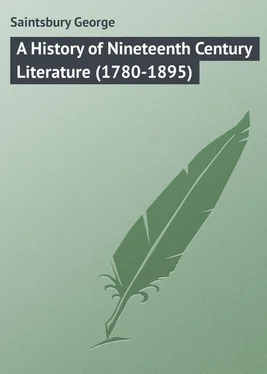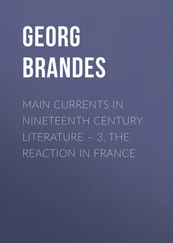George Saintsbury - A History of Nineteenth Century Literature (1780-1895)
Здесь есть возможность читать онлайн «George Saintsbury - A History of Nineteenth Century Literature (1780-1895)» — ознакомительный отрывок электронной книги совершенно бесплатно, а после прочтения отрывка купить полную версию. В некоторых случаях можно слушать аудио, скачать через торрент в формате fb2 и присутствует краткое содержание. ISBN: , Жанр: foreign_prose, на английском языке. Описание произведения, (предисловие) а так же отзывы посетителей доступны на портале библиотеки ЛибКат.
- Название:A History of Nineteenth Century Literature (1780-1895)
- Автор:
- Жанр:
- Год:неизвестен
- ISBN:http://www.gutenberg.org/ebooks/31698
- Рейтинг книги:5 / 5. Голосов: 1
-
Избранное:Добавить в избранное
- Отзывы:
-
Ваша оценка:
- 100
- 1
- 2
- 3
- 4
- 5
A History of Nineteenth Century Literature (1780-1895): краткое содержание, описание и аннотация
Предлагаем к чтению аннотацию, описание, краткое содержание или предисловие (зависит от того, что написал сам автор книги «A History of Nineteenth Century Literature (1780-1895)»). Если вы не нашли необходимую информацию о книге — напишите в комментариях, мы постараемся отыскать её.
A History of Nineteenth Century Literature (1780-1895) — читать онлайн ознакомительный отрывок
Ниже представлен текст книги, разбитый по страницам. Система сохранения места последней прочитанной страницы, позволяет с удобством читать онлайн бесплатно книгу «A History of Nineteenth Century Literature (1780-1895)», без необходимости каждый раз заново искать на чём Вы остановились. Поставьте закладку, и сможете в любой момент перейти на страницу, на которой закончили чтение.
Интервал:
Закладка:
The life of John Keats was even shorter and even less marked by striking events than that of Shelley, and he belonged in point of extraction and education to a somewhat lower class of society than any of the poets hitherto mentioned in this chapter. He was the son of a livery stable keeper who was fairly well off, and he went to no school but a private one, where, however, he received tolerable instruction and had good comrades. Born in 1795, he was apprenticed to a surgeon at the age of fifteen, and even did some work in his profession, till in 1817 his overmastering passion for literature had its way. He became intimate with the so-called "Cockney school," or rather with its leaders Leigh Hunt and Hazlitt – an intimacy, as far as the former was concerned, not likely to chasten his own taste, but chiefly unfortunate because it led, in the rancorous state of criticism then existing, to his own efforts being branded with the same epithet. His first book was published in the year above mentioned: it did not contain all the verse he had written up to that time, or the best of it, but it confirmed him in his vocation. He broke away from surgery, and, having some little means, travelled to the Isle of Wight, Devonshire, and other parts of England, besides becoming more and more familiar with men of letters. It was in the Isle of Wight chiefly that he wrote Endymion , which appeared in 1818. This was savagely and stupidly attacked in Blackwood and the Quarterly ; the former article being by some attributed, without a tittle of evidence, to Lockhart. But the supposed effect of these attacks on Keats' health was widely exaggerated by some contemporaries, especially by Byron. The fact was that he had almost from his childhood shown symptoms of lung disease, which developed itself very rapidly. The sense of his almost certain fate combined with the ordinary effects of passion to throw a somewhat hectic air over his correspondence with Miss Fanny Brawne. His letters to her contain nothing discreditable to him, but ought never to have been published. He was, however, to bring out his third and greatest book of verse in 1820; and then he sailed for Italy, to die on the 23rd of February 1821. He spoke of his name as "writ in water." Posterity has agreed with him that it is – but in the Water of Life.
Nothing is more interesting, even in the endless and delightful task of literary comparison, than to contrast the work of Shelley and Keats, so alike and yet so different. A little longer space of work, much greater advantages of means and education, and a happier though less blameless experience of passion, enabled Shelley to produce a much larger body of work than Keats has to his name, even when this is swollen by what Mr. Palgrave has justly stigmatised as "the incomplete and inferior work" withheld by Keats himself, but made public by the cruel kindness of admirers. And this difference in bulk probably coincides with a difference in the volume of genius of the two writers. Further, while it is not at all improbable that if Shelley had lived he would have gone on writing better and better, the same probability is, I think, to be more sparingly predicated of Keats.
On the other hand, by a not uncommon connection or consequence, Keats has proved much more of a "germinal" poet than Shelley. Although the latter was, I think, by far the greater, his poetry had little that was national and very little that was imitable about it. He has had a vast influence; but it has been in the main the influence, the inspiration of his unsurpassed exciting power. No one has borrowed or carried further any specially Shelleian turns of phrase, rhythm, or thought. Those who have attempted to copy and urge further the Shelleian attitude towards politics, philosophy, ethics, and the like, have made it generally ludicrous and sometimes disgusting. He is, in his own famous words, "something remote and afar." His poetry is almost poetry in its elements, uncoloured by race, language, time, circumstance, or creed. He is not even so much a poet as Poetry accidentally impersonated and incarnate.
With Keats it is very different. He had scarcely reached maturity of any kind when he died, and he laboured under the very serious disadvantages, first of an insufficient acquaintance with the great masters, and secondly of coming early under the influence of a rather small master, yet a master, Leigh Hunt, who taught him the fluent, gushing, slipshod style that brought not merely upon him, but upon his mighty successor Tennyson, the harsh but not in this respect wholly unjust lash of conservative and academic criticism. But he, as no one of his own contemporaries did, felt, expressed, and handed on the exact change wrought in English poetry by the great Romantic movement. Coleridge, Wordsworth, Scott, and even Southey to some extent, were the authors of this; but, being the authors, they were necessarily not the results of it. Byron was fundamentally out of sympathy with it, though by accidents of time and chance he had to enlist; Shelley, an angel, and an effectual angel, of poetry, was hardly a man, and still less an Englishman. But Keats felt it all, expressed what of it he had time and strength to express, and left the rest to his successors, helped, guided, furthered by his own example. Keats, in short, is the father, directly or at short stages of descent, of every English poet born within the present century who has not been a mere "sport" or exception. He begat Tennyson, and Tennyson begat all the rest.
The evidences of this are to be seen in almost his earliest poems – not necessarily in those contained in his earliest volume. Of course they are not everywhere. There were sure to be, and there were, mere echoes of eighteenth century verse and mere imitations of earlier writers. But these may be simply neglected. It is in such pieces as "Calidore" that the new note is heard; and though something in this note may be due to Hunt (who had caught the original of it from Wither and Browne), Keats changed, enriched, and refashioned the thing to such an extent that it became his own. It is less apparent (though perhaps not less really present) in his sonnets, despite the magnificence of the famous one on Chapman's Homer , than in the couplet poems, which are written in an extremely fluent and peculiar verse, very much "enjambed" or overlapped, and with a frequent indulgence in double rhymes. Hunt had to a certain extent started this, but he had not succeeded in giving it anything like the distinct character which it took in Keats' hands.
Endymion was written in this measure, with rare breaks; and there is little doubt that the lusciousness of the rhythm, combined as it was with a certain lusciousness both of subject and (again in unlucky imitation of Hunt) of handling, had a bad effect on some readers, as also that the attacks on it were to a certain extent, though not a very large one, prompted by genuine disgust at the mawkishness, as its author called it, of the tone. Keats, who was always an admirable critic of his own work, judged it correctly enough later, except that he was too harsh to it. But it is a delightful poem to this day, and I do not think that it is quite just to call it, as it has been called, "not Greek, but Elizabethan-Romantic." It seems to me quite different from Marlowe or the author of Britain's Ida , and really Greek, but Greek mediæval, Greek of the late romance type, refreshed with a wonderful new blood of English romanticism. And this once more was to be the note of all the best poetry of the century, the pouring of this new English blood through the veins of old subjects – classical, mediæval, foreign, modern. We were to conquer the whole world of poetical matter with our English armies, and Keats was the first leader who started the adventure.
The exquisite poetry of his later work showed this general tendency in all its latest pieces, – clearly in the larger poems, the fine but perhaps somewhat overpraised Hyperion , the admirable Lamia , the exquisite Eve of St. Agnes , but still more in the smaller, and most of all in those twin peaks of all his poetry, the "Ode on a Grecian Urn" and "La Belle Dame sans Merci." He need indeed have written nothing but these two to show himself not merely an exquisite poet but a captain and leader of English poetry for many a year, almost for many a generation to come. Wordsworth may have given him a little, a very quiet hint for the first, the more Classical masterpiece; Coleridge something a little louder for the second, the Romantic. But in neither case did the summons amount to anything like a cue or a call-bell; it was at best seed that, if it had not fallen on fresh and fruitful soil, could have come to nothing.
Читать дальшеИнтервал:
Закладка:
Похожие книги на «A History of Nineteenth Century Literature (1780-1895)»
Представляем Вашему вниманию похожие книги на «A History of Nineteenth Century Literature (1780-1895)» списком для выбора. Мы отобрали схожую по названию и смыслу литературу в надежде предоставить читателям больше вариантов отыскать новые, интересные, ещё непрочитанные произведения.
Обсуждение, отзывы о книге «A History of Nineteenth Century Literature (1780-1895)» и просто собственные мнения читателей. Оставьте ваши комментарии, напишите, что Вы думаете о произведении, его смысле или главных героях. Укажите что конкретно понравилось, а что нет, и почему Вы так считаете.












